Rural pageant crowns queer farmworker pride
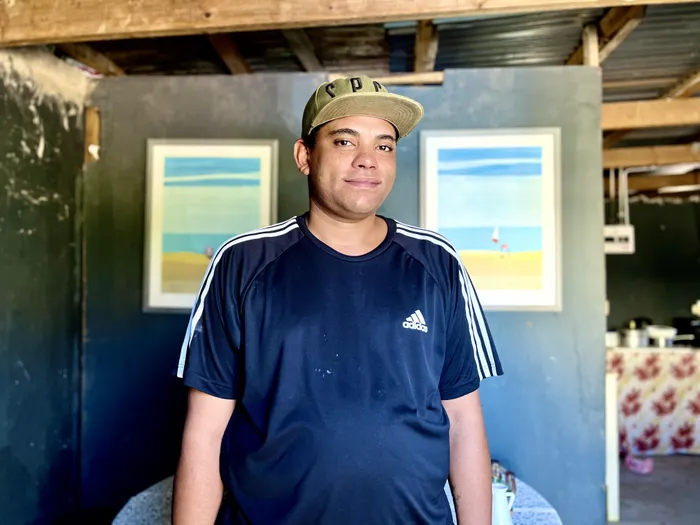
Rapheal February, was one of the participants in the town’s beauty pageant for farmworkers.
Image: Carl Collison
When Rapheal February left the Eastern Cape in 2019 to settle in the rural Western Cape town of Saron, his only employment option was as a farmworker.
Located approximately 130 km from Cape Town, Saron is home to approximately 7 000 people, many of whom are employed on the surrounding farms.
“This area only knows farm work. There are no other jobs. When I got here, they said, ‘Here’s work.’ So,” he shrugs, “I climbed on a lorry.”
The adaptation was not easy, he says. “It was my first time. I didn’t know anything. I mean, I came from a place where there are malls and stuff, but here I am: In Saron,” February says, laughing.
In addition to having to adapt to this new environment, there was also the heavily-gendered nature of his workplace.
“In the vineyard, if you’re gay, you are classified as a woman. You are not classified as a man. That’s not to say it is like that for all gay men, though. Remember, you get femme gay men and you get butch gay men. If you are femme, you are placed with the women. If you want to work with the men, that’s up to you. But most of us work with the women.”
While this division was something of an adjustment for February, it is, he says, welcomed by other queer farmworkers who occasionally come to work dressed in “little skirts and tops, bras and headwraps”.
“Sometimes they come with their wigs and dresses and so on,” he adds.
February’s assertion that “when I am working on the farm, I wear men’s clothing because I am not a drag queen” changed somewhat when he, along with some of Saron’s other queer farmworkers, entered and participated in the Mrs and Miss Saron Agri beauty pageant.
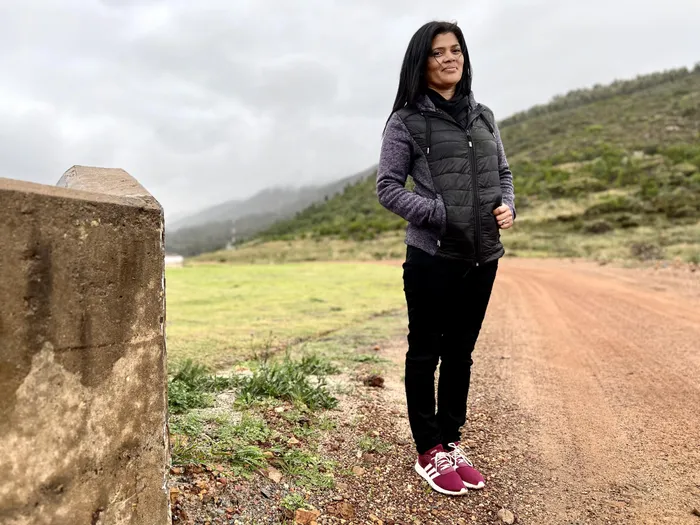
Despite some pushback, Maria Manuel stuck to her guns and included queer people in the pageant.
Image: Carl Collison
The pageant is the brainchild of Maria Manuel, who has successfully run it since its inception in 2023, and she is planning another for March next year.
Like February, Manuel also relocated to Saron from a big city – Cape Town, in her case – and took up work as a farmworker. At the time of the first pageant, she had been working as a general worker on the farm, DasBosch, which she beamingly refers to as “the most beautiful farm”.
Beautiful as the farm may be, the work, she concedes, is “very hard”. It is, in large part, due to the punishing nature of farm work that the idea of the pageant was born.
“When I first started as a farmworker, I noticed that there were older women working there. Women close to 60 years old. I would ask, ‘How long is aunty working here?’ And they’d been working there since they were children. From 12 or 13, until today.”
Taking her inspiration from the annual Spring Queen contest (the former annual beauty pageant for factory workers across Cape Town), Manuel began putting together Mrs and Miss Saron Agri as a church fundraiser.
Says Manuel: “I just thought: Let’s give these women their moment to shine. Because many of them never had a prom or matric ball. When it comes to their children’s matric ball – or their children’s baptism or confirmation – they would save what little money they have and put everything into these events for their children. But they always put themselves last.”
Manuel’s decision to open the pageant to “whoever works on a farm – whether you are white, black, gay or whatever” did not sit well with everyone.
Established as a mission station in 1848, Saron is still a deeply religious town, and one where attitudes towards queer people are often conservative.
Says February: “Saron is a very small town. Very loving, but there is still a lot of hate – especially against us as LGBTIQ+ people.”
Although Manuel insists that members of the Old Apostolic Church, to which she belongs, “didn’t have an issue at all” with including LGBTIQ+ people in the event, some quarters viewed things differently.
“They asked me why these LGBTIQ+ people would also be participating. That they should be in a separate event. But I took it as: Everyone is working on farms. So I can’t let them participate separately,” she says.
Her unwillingness to yield paid off. Soon after announcing the event would take place, and putting out a call for participants, Manuel says there was great excitement.
On the day of the 2023 pageant, at the Saron Community Hall, lorries and buses started arriving three hours before the event, transporting people eager to ensure they had seats.
Backstage in the community hall’s dressing room, the 34 participants (representing seven farms) readied themselves.
Says February: “Everybody helped each other. There could have been a lot of disunity backstage among the contestants, but everyone wanted everyone else to look beautiful as they stepped out. And for me that was the cherry on the cake.”
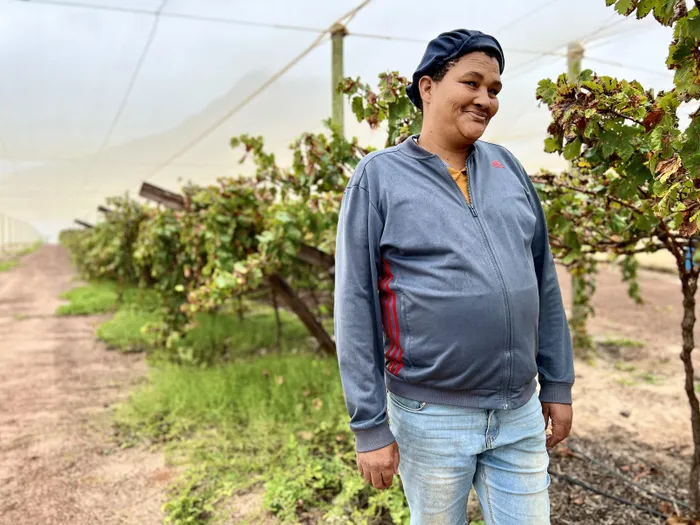
Willem van Rooy, 44, overcame his nervousness about being in the pageant once he heard the audience cheering him on.
Image: Carl Collison
Willem van Rooy, a gay man who represented DasBosch, laughs as he recalls his nervousness at he 2023 pageant.
“I kept thinking, ‘I can’t model. I’m not going to make it.’ At work, I told them, ‘How am I going to look? I’m so tall! What will I wear?’ But when they started doing me up, people – my people – were telling me: ‘Wow, Willie, you look pretty.’ In that moment, I decided to make it my evening… And when people were cheering me on, it gave me courage and hope. To me, it felt like, ‘It’s your time. Do it.’”
Van Rooy smiles shyly as he adds: “It was my first time, but I was one of the finalists. I was really proud of myself.”
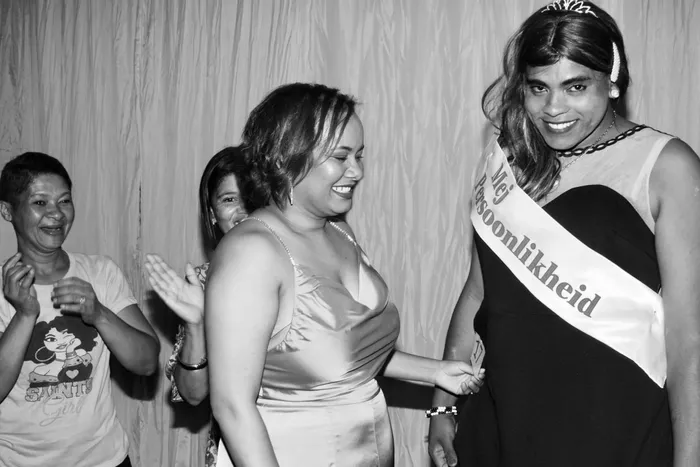
For queer folk in the small rural Western Cape town of Saron, participating in the recent queer-inclusive beauty pageant – Mrs and Miss Saron Agri – opened the door to a greater sense of purpose and self-worth.
Image: Kallie Smit
For Manuel, this sense of pride is especially important, given the fact that, as she says, “nobody sees us farmworkers”.
“At the end of the day, that apple you buy at Woolworths: we picked it… It was hot. Forty degrees. And while you were sitting at the beach, we were working hard. In winter, while you were under your duvet, we were working in the rain. Really! We work very hard, but nobody sees farmworkers. So this event was, like, I don’t know… I can’t describe it. It was amazing."
“Amazing” is the same word February uses to describe his first time in drag, truly expressing himself in his new hometown – and walking away with the Miss Personality title.
“I was always scared, but no longer. For me, it wasn’t about winning a prize. For me, it was about showing people I am somebody. I am a person. And I am valuable."
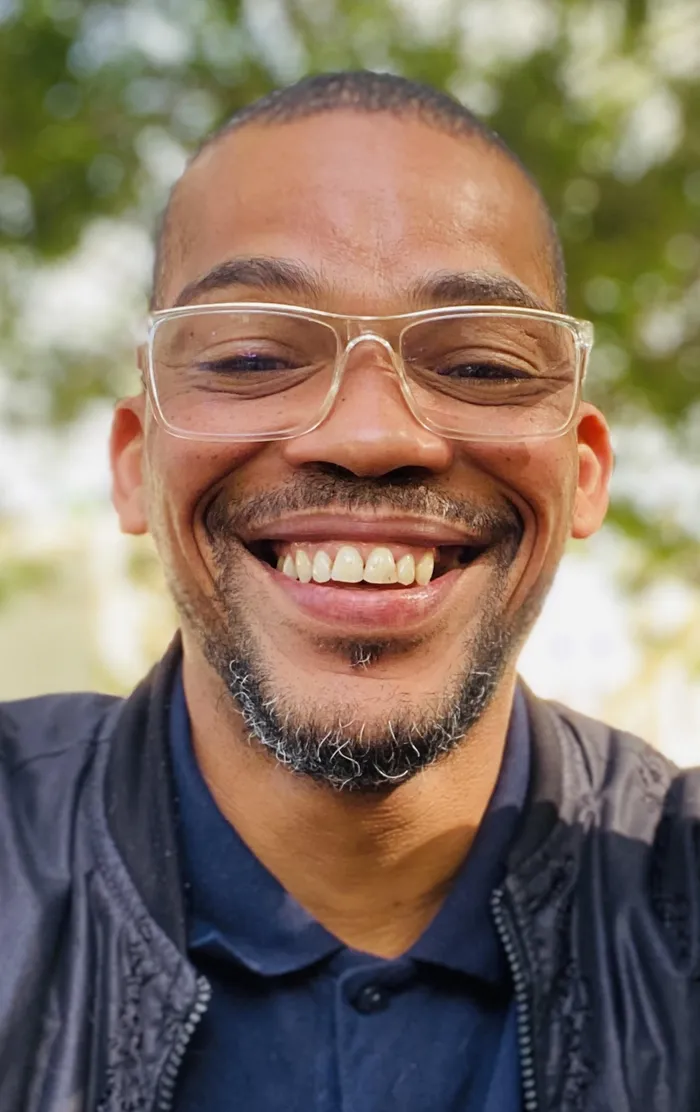
Carl Collison is a journalist, photographer, filmmaker, and researcher. He founded and runs Beyond the Margins, a platform dedicated to producing LGBTIQ-related content from across Africa.
Image: Supplied
* Carl Collison is a journalist, photographer, filmmaker, and researcher. He founded and runs Beyond the Margins, a platform dedicated to producing LGBTIQ-related content from across Africa.
Related Topics: